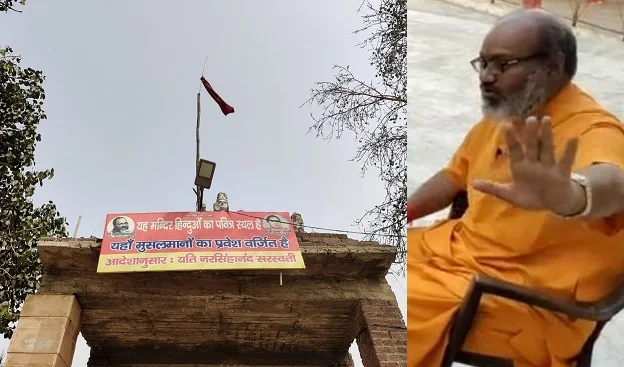 |
| Board barring Muslims' entry (left) by temple mahant (right) |
Two journalists from well-known news and current affairs portal “Millat Times”, which publishes everyday in Urdu, Hindi, and English, have been denied entry for coverage on account of their religion. Bringing this to light and taking strong exception to this, the Press Club of India (PCI) said, “This is singularly unfortunate”, and PCI “criticises the incident in the sharpest terms.”
The incident took place last week, when two reporters went to Dasna near Delhi to cover the news story of a young Muslim boy who was beaten up for drinking water at a temple by the temple authorities. After meeting the victim, the journalists sought a meeting with the temple priest for the sake of journalistic balance and ascertaining all sides of a story, PCI said in a statement, signed by Anand K Sahay, president, and Anant Bagaitkar, secretary-general.
“It appears they were being allowed in, but once they gave their names, entry was denied as they were not of the Hindu faith. Another journalist was being let in as they stood standing, shocked by the occurrence”, PCI said, adding, “The ‘Millat Times’ reporters have clearly been obstructed from performing their professional duty on account of the play of the communal factor.”
Recalling how in February 2020, some journalists covering the communal violence in northeast Delhi were being “forced by violent communal mobs to strip to ‘prove’ that they were not the 'other',” PCI said, “In independent India such shameful incidents are coming to light because the virus of communalism has been unleashed with great force -- and impunity -- in recent times, with many holding public office and constitutional positions encouraging this deplorable trend.”
The statement asks the community of journalists in the country to “resist such moves” and authorities “to take note and take all necessary action.”

Comments
Then, the bigotry of Mecca (and silence of seculars) is a bigger issue than Dasna temple.
Muslim journalists can enter temple by simply give an undertaking that respect Hindu beliefs. As simple as that.